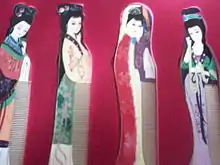Four Beauties
The Four Beauties or Four Great Beauties are four Chinese women, renowned for their beauty. These were Xi Shi, Wang Zhaojun, Diaochan, and Yang Guifei.[1] The scarcity of historical records concerning them meant that much of what is known of them today has been greatly embellished by legend. They all were said to have in some manner caught the attention of a ruling king or emperor in their respective eras.[1] They gained their reputation from the influence they exercised over kings and emperors and, consequently, the way their actions impacted Chinese history. Three of the Four Beauties brought kingdoms to their knees and their lives ended in tragedy.

| Four Beauties | |||||||||||||||
|---|---|---|---|---|---|---|---|---|---|---|---|---|---|---|---|
| Chinese | 四大美女 | ||||||||||||||
| |||||||||||||||
| Four Great Beauties | |||||||||||||||
| Chinese | 四大美人 | ||||||||||||||
| |||||||||||||||
The Four Beauties of China
The Four Great Beauties lived in four different dynasties, each hundreds of years apart. In chronological order, they are:
- Xi Shi (c. 7th to 6th century BC, Spring and Autumn period), said to be so entrancingly beautiful that fish would forget how to swim and sink below the surface upon seeing her reflection in the water.[2] Xi Shi's hometown is Zhuji, Zhejiang Province. Zhuji was the capital of the Ancient Yue Kingdom. Goujian, the King of Yue Kingdom, endured ten years hardship (sleeping on brushwood and tasting the gall) to accomplish his ambition to beat Fuchai, the King of Wu Kingdom. Xi Shi was part of his plan. Despite the fact that Xi Shi was in love with Fan Li, Goujian sent Xi Shi as a gift to Fuchai who was dazzled by her beauty and fell in love with her. Fuchai lost his fighting will after he met Xi Shi, spending all his time entertaining Xi Shi. Due to this, Goujian was able to defeat Fuchai. Fuchai regretted accepting the gift and committed suicide. There are two stories of what happened to Xi Shi. The first one was that Goujian killed her by drowning her because he was afraid that he would be mesmerised by her the same way Fuchai was. The second story was that she eventually came together with Fan Li and they lived happily ever after, apart from everyone else.
- Wang Zhaojun (c. 1st century BC, Western Han dynasty), said to be so beautiful that her appearance would entice birds in flight to fall from the sky.[3]Wang Zhaojun was said to have entered the harem of Emperor Yun at a young age. She remained a lady-in-waiting and was never visited by the emperor. At that time, the concubines of the emperor were chosen through portraits and most of the women bribed the painters into making their portrait look better. Wang Zhaojun, however, refused to do this and was painted an ugly photo. In 33 B.C., Hu Hanye visited and asked for a Han beauty as his wife. Therefore, he was presented with Wang Zhaojun and Emperor Yun was shocked. The painter who painted her photo was later executed.
- Diaochan (c. 3rd century, Late Eastern Han/Three Kingdoms period), said to be so luminously lovely that the moon itself would shy away in embarrassment when compared to her face.[4]
- Yang Guifei (719–756, Tang dynasty), said to have a face that puts all flowers to shame.
Idiom
Well-known idioms describe the Four Beauties.[5] The exact origin of these idioms is debated.
| Chinese | English |
|---|---|
| 西施沉魚 昭君落雁 貂蟬閉月 貴妃羞花 |
Xi Shi sinks fish Wang Zhaojun entices birds into falling Diaochan eclipses the moon Yang Guifei shames flowers |
These separate idioms are sometimes merged to describe especially beautiful women or simply to refer to the Four Beauties' legendary good looks. The merged idiom is 沉魚落雁, 閉月羞花 (sinks fish and entices birds to fall, eclipses the moon and shames flowers); the two parts can also be used separately.
See also
References
- Woo, X.L. (2016). Love Tales of Ancient China. Algora. pp. 1–4. ISBN 978-1-62894-204-0.
- Big5.ce.cn. "Big5.ce.cn Archived 2011-07-25 at the Wayback Machine." 西施浣紗——沉魚. Retrieved on 2010-02-20.
- Big5.ce.cn. "Big5.ce.cn Archived 2011-07-25 at the Wayback Machine." 昭君出塞——落雁. Retrieved on 2010-02-20.
- Big5.ce.cn. "Big5.ce.cn Archived 2011-07-25 at the Wayback Machine." 貂蟬拜月——閉月. Retrieved on 2010-02-20.
- Xinhuanet.com. "Xinhuanet.com Archived 2013-02-06 at WebCite." 纪连海叹说四大美人 . Retrieved on 2010-02-20.